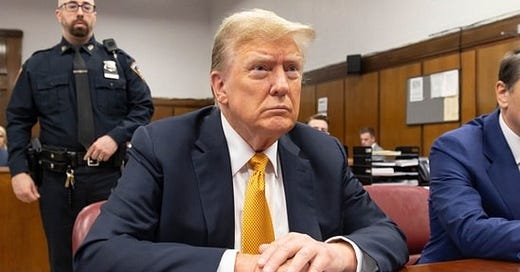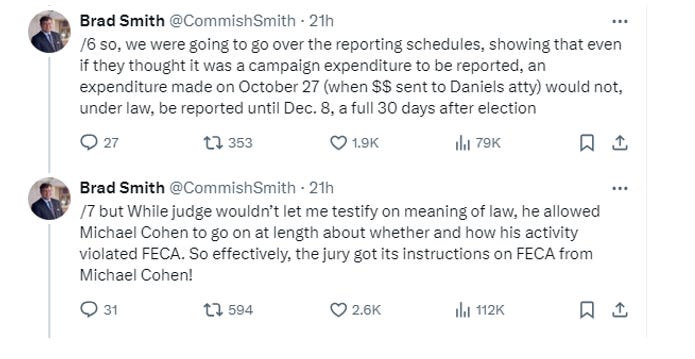It’s a wrap in The People of the State of New York v. Donald J. Trump. Both the State and the defense have rested. Trump’s fate is now up to the jury, which will begin deliberations next Wednesday.
And while the week was short – there were less than two days of testimony – it was, at times, explosive. Frustration from a defense witness caused Judge Merchan to clear out the courtroom and the State’s star witness, Michael Cohen, admitted to stealing from the Trump Organization.
Last week concluded with the cross examination of Michael Cohen. And cross examination continued Monday morning.
The Examination of Michael Cohen (continued)
To provide a brief recap, last week’s cross of Cohen focused on a number of key areas: Cohen’s failed memory, his bias and motives to lie, his personal reasons for protecting Trump via the Stormy Daniels deal, and Cohen’s history of lies and crimes. It established that Cohen couldn’t recall important events and discussion concerning his interaction with the DA’s office, he has made millions in his shift to being anti-Trump, he has often expressed his desire to see Trump “end up in prison,” and he has lied under oath numerous times and has readily engaged in fraud to further his personal interests.
That theme continued on Monday with the revelation that Cohen stole $30,000 from the Trump Organization. Here’s how that went down. Cohen represented to the Trump Organization that a contractor, Red Finch, was owed $50,000 for polling. Cohen paid Red Finch $20,000 and pocketed the rest, allegedly because he was upset that his yearly bonus had been cut (the reason was divulged during re-direct).
Q. So you stole from the Trump Organization, right?
A. Yes.
There’s some speculation that the DA’s office agreed not to charge Cohen for this theft in light of his testimony. While that’s possible, we think it more likely that the DA’s office has taken the position that the five year statute of limitations for grand larceny has run.
The defense also extracted from Cohen important admissions about the scope of the legal work he did on behalf of Trump after Trump’s election. Remember, the State has argued that Cohen wasn’t paid for any type of legal services (which were invoiced as such), but because he was being reimbursed for the Daniels deal. Cohen admitted to serving as Trump’s personal attorney in 2017 and publicly represented himself as Trump’s personal attorney at that time.
Cohen also admitted to his prior denials of Trump’s knowledge of the Stormy Daniels payment. He maintained Trump didn’t know anything about the payment in 2018. He told the BBC that he didn’t inform Trump about the deal. Finally, Cohen had the audacity to blame Trump for losing his law license when, in truth, it was due to Cohen’s felonies.
On re-direct, the State sought to close its case – and the testimony of its final witness – by emphasizing Trump’s involvement in the alleged crimes. Cohen was allowed to testify that the payment to Stormy Daniels constituted a campaign contribution, that Trump approved the false statements concerning the invoices and the Stormy Daniels NDA, that the Stormy Daniels NDA was illegal, and that his invoices seeking payment for “legal services” were false.
Robert Costello
Trump’s team called only one primary witness in its defense: Robert Costello, Michael Cohen’s former attorney and advisor. (They also called a paralegal to summarize the dates and times of phone calls between Costello and Cohen.)
Last week, Costello revealed to the House that Cohen falsely testified concerning Trump’s involvement in the Daniels payoff and his reasons for buying the story. Before he was called as a witness, Judge Merchan severely limited Costello’s testimony. He only allowed the defense to examine Costello concerning Cohen’s prior inconsistent statements and to offer rebuttal testimony concerning the “pressure campaign” Cohen previously described.
Costello first met Cohen in April 2018, where they discussed Cohen’s home being searched by the FBI and the issue of cooperation with federal authorities. Cohen was manic at the time and was seeking legal advice. Costello, mindful of his ethical duty to Cohen, recommended he cooperate, to which Cohen replied: “I swear to God, Bob, I don’t have anything on Donald Trump.” Cohen also informed Costello that Trump knew nothing of the Daniels payment (contradicting Cohen’s testimony). Rather, Cohen said he did that contract “on his own.”
Throughout Costello’s testimony, Judge Merchan repeatedly sustained the State’s objections, not allowing Costello to answer questions concerning his interactions with Cohen and others (like Rudy Giuliani). Costello, a former federal prosecutor, grew frustrated. He remarked “jeeze” after one objection was sustained. At another time, Costello said “Strike it” after Judge Merchan disallowed questions about Cohen’s instructions to Costello.
Q. [Asking about Costello’s statement.] What did you mean by that?
State: Objection:
Judge Merchan: Sustained.
Costello: Jeeze.
Q. Was that in response to something Michael Cohen had instructed you to do?
State: Objection.
Judge Merchan: Sustained.
Costello: Yes. Strike it.
Judge Merchan’s frustration grew. He admonished Costello to stop “rolling his eyes” and to stop “giving me side eye.” When Judge Merchan asked Costello if he was “staring me down right now?”, Costello tried to answer – only for Judge Merchan to kick the audience and press out of court.
Judge Merchan: Your conduct is contemptuous right now. I’m putting you on notice that your conduct is contemptuous. If you try to stare me down one more time, I will remove you from the stand.
I will strike his entire testimony; do you understand me?
Trump attorney: Yes, Judge, I understand.
A couple points on Judge Merchan’s behavior. First, there’s no problem with dressing down a witness that’s commenting on the Court’s rulings. The witness is there to testify to the facts, nothing more. Even Costello knew he was crossing the line with his remarks. Your humble author has been yelled at by a judge for far less.
But second, in our opinion, in was totally inappropriate for Judge Merchan to threaten striking Costello’s “entire testimony.” Trump’s team didn’t encourage or elicit those responses from Costello. They didn’t overstep a court order (like the prosecution did with their questions to Stormy Daniels) or otherwise encourage Costello’s behavior. Judge Merchan has done little to benefit the defense during this entire trial, and this threat was just another example of his bias.
Once trial resumed, Costello explained he had reached out to Giuliani on behalf of Cohen (Giuliani was serving as counsel to Trump at the time). That he had Cohen’s interests in mind. And that Cohen refused to pay him for his legal work. Costello further testified that his correspondence to Cohen contained the standard attorney language that the communications were subject to the attorney-client privilege. Cohen never responded that Costello wasn’t his attorney.
The State’s cross examination of Costello focused on his e-mails concerning Cohen. The State didn’t really land any punches – they would ask Costello about e-mails complaining about Cohen (one said of Cohen: “we’ve been played”) and then shut him down when he offered to explain the context. To the jury, this must have felt like the State wanted to avoid those answers. The State also accused Costello of wanting to “intimidate” Cohen through his House testimony, which Costello called “Ridiculous.”
And with that, the defense rested. Trump wasn’t called as a witness in his defense - no surprise there.
Judge Merchan Shuts Down the Testimony of Trump’s Expert
Former FEC Commissioner Brad Smith was to be called by Trump – until Judge Merchan restricted his testimony on the complexities of the Federal Election Campaign Act. What Smith could discuss would have been so limited that he was scratched as a witness. According to Smith, he was going to share how election laws have been interpreted, such as expenditures made or acts done “for the purpose of influencing an election.” He would have also explained reporting requirements and how those would have been due after the election.
Smith himself has criticized Judge Merchan’s exclusion of much of his anticipated testimony, pointing out that Michael Cohen was allowed to testify on how his conduct violated the Federal Election Campaign Act:
What is to come…
After the State closed, the Defense requested an order of dismissal, essentially arguing the State alleged no criminal conduct (no false business record and no intent to defraud or conceal) and that Cohen’s testimony was not credible as a matter of law. The State responded that their case was sufficient, that Trump “set in motion” the events that led to the false business entries.
Judge Merchan reserved his decision for a later date. At this point, it would be a shock if the motion were granted. Should Trump be convicted, expect his attorneys to request the Court to throw out the judgment on the basis that the verdict is against the weight of the evidence. It’s hard to see Judge Merchan siding with the defense if Trump is found guilty. Judges give great deference to the conclusions of a jury, especially with respect to how they judge the credibility of a witness.
Closing arguments are scheduled for next Wednesday, after which deliberations begin. Currently, the parties and Judge Merchan are still working through jury instructions. Expect no favors from Judge Merchan as the instructions are finalized.





Could the judge's behavior be a sign of frustration that the prosecution basically has nothing to prove their case?
Dershowitz commented on the clown world decorum of the judge from yesterday’s antics. I think it is likely that Bragg and the DOJ will buy off this jury for a guilty verdict using Judge Merchan’s daughter's money she received from Dan Goldman and his political cronies. Would be a fitting end to this shit show. Truly made for Netflix.